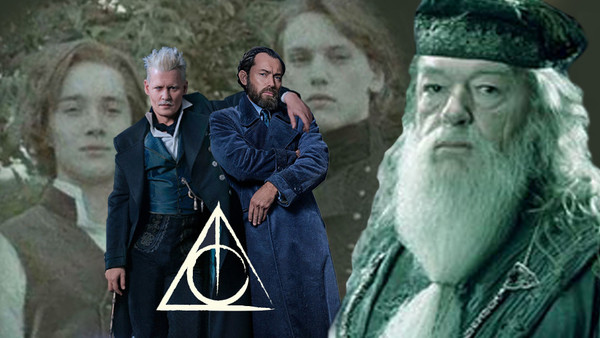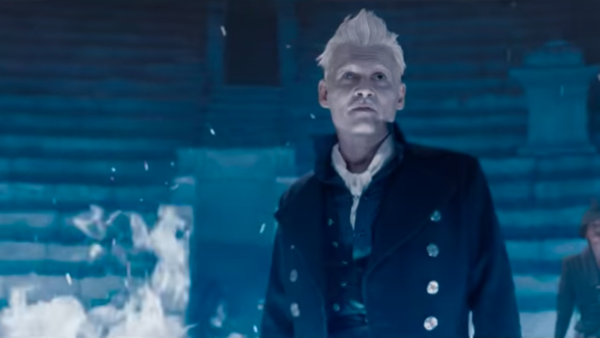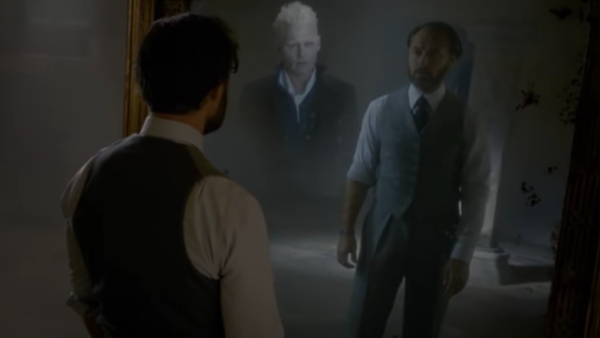Harry Potter: The Secret History Of Dumbledore And Grindelwald
Romance, deception and manipulation lie at the heart of the two most powerful wizard's relationship.

Albus Dumbledore had a stunning secret. It was a dark secret that would have threatened to twist his reputation as he lived and could have inspired some questions over his suitability as the headmaster of Hogwarts. It was a secret that only came out after his death at the hands of Severus Snape and which transformed his perception among even his most ardent fans.
It wasn't that the beloved headmaster was gay, as JK Rowling confirmed retrospectively, but the specific manner of his defining romantic relationship. As was hinted through the main Harry Potter series, then confirmed by Rowling and finally explored explicitly in the Fantastic Beasts movies, Dumbledore - the greatest light wizard of all time, possibly - was in love with the most fearsome Dark Lord ever.
There has been some assumption that Dumbledore took the "secret" of his homosexuality to the grave, simply because fans and the children he taught in Harry Potter's generation were not aware of the fact. The reality, however, is that Potter's series was not Dumbledore's story; he was merely a supporting element in the Boy Who Lived's Saga. His sexuality was a purely incidental, unimportant point, just as what McGonagall had for breakfast was or what sort of music generally played in the Hufflepuff common rooms.
There is no suggestion that Dumbledore's sexuality was a secret to his closest friends: the truth we know is that they simply didn't mention it while the rise of Voldemort was the pressing issue of the time. It seems unlikely that his closest friends didn't know, just as it seems unlikely that they'd disclose it to the children whose eyes we saw the entire Potter series through.
That wasn't his dark secret: his dark secret was - in JK Rowling's words - that he was in love with Gellert Grindelwald.
This is a love - whether reciprocated or painful and unrequited, it's not been fully confirmed yet - which we're going to see explored in the Fantastic Beasts sequels. Which hangs over those stories like a heavy, ominous mist, pregnant with graver secrets and the mystery of what really happened the day Ariana Dumbledore was killed.
To explore where the relationship might go in the future, however, we have to look at where it began and how it blossomed, as we look back at the Secret History of Dumbledore and Grindelwald.

The pair's relationship began after Grindelwald was expelled from Durmstrang for sick experiments on other students despite his academic aptitude and potential. He met Dumbledore in the summer of 1899 when his obsessive pursuit of the Deathly Hallows led him to Godric's Hollow, where his great-aunt Bathilda Bagshot lived. They were immediately drawn together by their intellect, magical ability and the dark appeal of Grindelwald's ideas, which Dumbledore was intoxicated by, despite his better judgement. He became indoctrinated even as the pair developed a genuine friendship.
That same summer, Aberforth Dumbledore learned of their plans for revolution and confronted the pair, leading to the three way duel that was said to have resulted in Ariana's death. Grindelwald fled and was apportioned blame, though Aberforth blamed his brother.
But alongside the pair's plotting and friendship, Dumbledore was being manipulated without really realising it. Grindelwald essentially weaponised their friendship to take advantage of his new friend's personal history. Albus had grown up with the spectre of dangerous Muggles hanging over his family as he'd seen his sister bullied by Muggles to the point of a dangerous breakdown, his father sent to Azkaban for getting revenge on them and his mother killed by a magical accident caused by Ariana's suppression of her magic. He was vulnerable and in the charismatic new friend, he found someone who offered an enticing solution. Something that would help wizards for the greater good.
Grindelwald knew why Dumbledore needed him and he probably also knew that the young man was falling in love with him. There can be no doubt he used this against Dumbledore, which is why he was so emotionally wounded by him and so vulnerable to him even years after they parted.
For a man so powerful and so seemingly in control as Dumbledore, Grindelwald represented a weakness: a vulnerability that not even Voldemort's infamy could inspire in him. From what Rowling has publicly stated on Grindelwald, he seems to have abused the dynamic and taken advantage of his former friend.
Devastatingly, Rowling has hinted that Dumbledore's love for Grindelwald was not returned, but that he used Dumbledore's infatuation against him, essentially weaponising it. Could this be why Dumbledore was so susceptible to the Dark Arts leanings that his friend preached so venomously? Could this explain that particularly uncharacteristic behaviour from the Hogwarts master?
"I think he was a user and a narcissist and I think someone like that would use it, would use the infatuation. I don't think that he would reciprocate in that way, although he would be as dazzled by Dumbledore as Dumbledore was by him, because he would see in Dumbledore, 'My God, I never knew there was someone as brilliant as me, as talented as me, as powerful as me. Together, we are unstoppable!' So I think he would take anything from Dumbledore to have him on his side."
There you have it: Rowling essentially confirms that Grindelwald was emotionally manipulating Dumbledore - who he saw as an invaluable and supremely powerful potential ally beyond just a friend - and probably wasn't in love with him the same way.

Even after Grindelwald's rise and the unspeakable acts of evil he perpetrated, Dumbledore's infatuation continued: even into the 1940s, Albus counted him as his deepest, most irresistible desire (hence seeing him the Mirror Of Erised) and it seems his Dark activities and multiple murders were not enough to dampen that affection.
For years, it was assumed that Dumbledore kept away from Grindelwald for fear that he would confirm that Dumbledore himself killed Ariana, but it's something more than that. Dumbledore was a man torn apart by love, who struggled for decades with the weight of that romantic link despite the right thing being for him to take Grindelwald down. He was, after all, the most skilled wizard in the world and the only one capable. He resisted not because he didn't agree with destroying Grindelwald (hence employing Newt to do so in his place) but because he'd be faced with the need to destroy his love.
Eventually, Grindelwald's crimes became too much and Dumbledore was forced to turn on his love and defeat and imprison him. It was counted as a heroic act, but that is nothing compared to the pain he must have felt to ignore his feelings for the Greater Good. That's not only why it's not right to dive into their relationship too much in the early Fantastic Beasts sequels, but also proves where Dumbledore got his ruthless edge from when it came to using Harry Potter against Voldemort.
He knew by then more than anything that the pawn sacrifice that would serve Ron Weasley so well in The Philosopher's Stone was a necessary pain. And sometimes, the pawn you sacrifice has to be your own feelings.